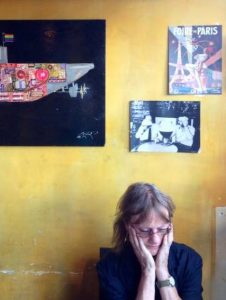Can you tell Ink Pantry about your journey as a poet? What lead you to write poetry?
I am currently doing an online part-time course in Creative Writing, specialising in Poetry, with Manchester Metropolitan.
Art and Art History were my main concerns as a practitioner and teacher, but I wrote a few poems over time, taking it further a few years ago when I chose a two-year Creative Writing Course with the Open University as part of an Open Degree. I have also enjoyed and been stimulated by several excellent Arvon courses in Lumb Bank, Yorkshire. I like the idea of a target, of the support and opportunities the aforementioned have given me.
Do you write prose? Have you thought about screenwriting? Radio?
I have written a few short stories and a radio play. The latter I found challenging and interesting so have decided to try and adapt a group of recent poems into short plays as part of an MA project.
What is the poetry scene like where you live?
I live in a small market town here in Normandy. There is no “poetry scene” as such, so online courses and the contact with other poets met on Arvon courses provide stimulus and exchange, plus I have a good critic in my daughter who reads my work and offers constructive advice.
Who inspires you? Have you a favourite poet?
I remember reading TS Eliot as an art student and being quite awestruck by its fragmentary construction, then later Ted Hughes’s powerful visceral language. Seamus Heaney has a profound impact, not only his poetry, which is so grounded yet carries a strong mythological sense, but his writing on poetry too. More recently I have been inspired by Michael Symmons Roberts and Dorothy Molloy. Luke Kennard and Ian Seed are more recent “discoveries”. I like the energy and vibrancy in Kennard’s work and the sense of a theatre of the absurd. Seed’s unsettling prose poems have encouraged me to experiment with that form.
What do you care about? What themes keep cropping up in your writing?
There are several recurring themes and topics in my work which I have been trying to group together recently; e.g. my feelings re. la chasse here in France; the birth and early months of my grandson; the surreal in my daily life; and the small occurrences and exchanges in this rural town with neighbours, shopkeepers, etc. I also realize “loss” is an overriding element in many poems since the death of my husband seven years ago.
Have you any advice for budding poets?
I would only suggest to anyone wanting to write poetry, read a great deal of poetry, more than you write and across many styles and times and just experiment. The Arvon courses mentioned before are a wonderful stimulus and possible support system.
What are you reading at the moment?
I have quite a wide poetry collection and dip into it regularly. I am reading the novel The Yellow Birds by Kevin Powers after reading through his “Letter Composed During a Lull in the Fighting” – a group of very affecting poems deriving from his part in the Iraqi conflict.
What is your creative space like?
I live in a small half-timbered house. The first floor is a large open-plan space, and I work on an old, oak table in one corner; it’s a solid, Cornish farm table I have had for many years and its substance is reassuring. I have a view across to a line of tall poplar trees bordering a river which is also reassuring – and stimulating.
Can you share with us a couple of your poems?
Little Warheads
They slivered into the proffered tin,
ice sprinkled around torpedo slicks,
sky reflected in the puissant gleam
of their prismatic scales. I thanked him,
bearded man at the dechetterie
giving away his morning’s angling. (fishing)
I had gone to recycle cardboard
and came back with a tin of five fish.
The State of the Pavements
The tyres scuff and skew, but strong springs cosset him.
I walk him in his bebe confort along roads and lanes I know
more intimately now, by narrow pavements, shuttered windows
with broken bergeres and rusted hinges, past stone-wedges of doorsteps
blocking my way, over odd kerbs, palimpsests of successive
community decisions, past precarious plantpots with dried out herbs.
Past the house that will be a brocante,
the house that was the doctor’s surgery,
past Isabelle’s sewing room,
the one-time mercerie,
the house attached to a shed,
and the cobbled alley of broken windows, tilted slates and slanted walls.
He lightly pitches stray notes and trills.
I push past slag coloured pigeon shit piles
and empty houses freighted with them,
past a memory of a man walking a dog,
a torn towel over his shoulder, loud parrot on top.
A shutter swings open, a cage covered in a scrap
of cloth barely conceals the screeching bird.
A shadow passes over winging. Those piles
spool up flapping and cooing in low tones circling
slip-slated rooftops in search of other takeover zones.
I wipe his hot head with a moistened towel.
Must tell the mairie about the state of the pavements.
What is next for you? What plans have you got?
I hope to complete the MA course in the next couple of years and there is a possibility of a small publication of some of my work, but it is the process of writing that is the most fulfilling thing. I will also be joining another Arvon course at Lumb Bank in July.

